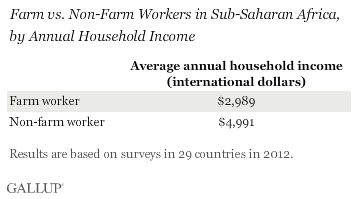One in Five African Adults Work on Farms
Gallup released a detailed research report that stated that 1 in 5 sub-Saharan African adults work on farms. This fact has broad implications for international development, GDP, the nations' Current Account and internal growth of industry.
Gallup interviewed 31,000 adults throughout Africa and found that these 20% of African adults are working on farms, causing little to no upward mobility for families of the workers since, by in large, the African workforce is older and less educated. Taking the 20% figure, and extrapolating it to the region's population, it means that 84 million adults are employed by the industry.
In order for the industry to thrive in Africa this 20% population (84 million) will need to grow, but it will need to grow in a more sustainable, future-forward way so as to implement new methods, technology and engage in partnerships to assure that the industry can yield enough to feed the sub-Saharan region, and eventually post a surplus to trade with.
An "out of touch" labor force working on farms means that implementation of modern agricultural methods and technology will lag. These advances would increase crop yields, provide methods to better survive inclement conditions, as well as bear fruit that would become a source of export.
Non-farm workers make early twice as much in a year.
In order for the industry to grow, and sustain itself, it must begin to find ways to compensate its laborers better that begins to march closer to non-farm workers. Currently a farm worker makes about half as much as non-farm workers. This might provide enough purchasing power within the agricultural regions in which they work, but it is probably not enough to sustain growth and development in a way that can change an industry.
There was an interesting positive note: families of farm workers had a higher average number of children within the household. As the sectors' labor force is getting older, an above average amount of young blood entering the work force (maybe entering agriculture) could rejuvenate the industry, force it to adopt more disruptive technologies and force a change from subsistence to surplus farming. This would mean more partnerships with NGOs, industry and governments to ensure that no adverse policies, tariffs or any other impediments would prevent growth.
The Food and Agriculture Organization (FAO) mentioned in a report that investing in the "enhancement of agricultural productivity and engagement of youth, smallholder, and family farmers are among the key priority areas" The FAO have identified that these policies are important to "accelerate agricultural transformation and eradicate hunger in the region."


